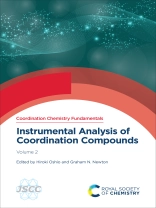Various types of physical measurements are available for the study of metal complexes. In pursuing the chemical and physical properties of metal complexes, it is necessary first to clarify what you want to know about and then select the most suitable measurements. To understand the experimental data obtained, it is essential to comprehend ligand field theory and a wide range of fundamental chemistry, such as quantum chemistry, thermodynamics, kinetics, equilibrium theory, analytical chemistry, surface chemistry, and solid-state physics.
This book is Volume 2 in a set comprising two volumes of English translations of books originally published in Japanese. They are translated by the original authors with a full verification process. They describe the principles and practical methods of physical measurements and the fundamental theories for understanding the data obtained. The instrumental analyses dealt with cover measurements of solid, liquid, and gaseous states, as well as surface analysis. As a key resource for graduate students and researchers in coordination chemistry and its complementary interdisciplinary fields, the books are also an excellent reference for experienced researchers.
สารบัญ
- Magnetic Measurement
- ESR Spectroscopy
- Solid State NMR
- Mössbauer Spectroscopy
- X-Ray Absorption Spectroscopy
- Surface Analyses AFM and STM
- Transmission Electron Microscopy
- Fluorescence and Phosphorescence Spectroscopy
- Mass Spectrometry
- Photoelectron Spectroscopy












